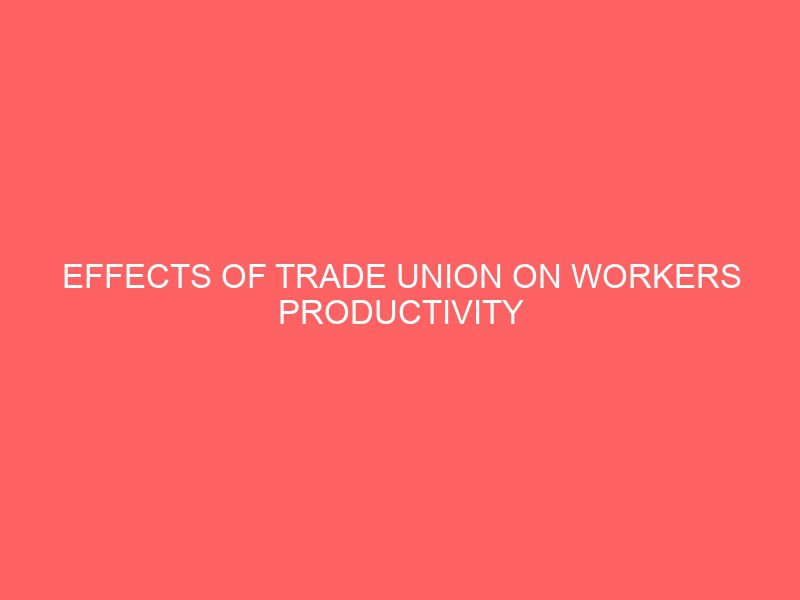Description
ABSTRACT
The research work focus on the Effect of Trade Union on Workers Productivity and organizational behavior. Trade Union has been one of the most discussed topics in the field of Industrial Relations, However, the main essence to Trade Union is to allow workers to determine collectively the conditions of their employment which they cannot hope to pursue as individuals. This project therefore tried to survey the perception of workers particularly Nigeria Eagle Flour Mills Limited Ibadan. Oyo State. It was concluded and shown clearly that Trade Union have effect on workers productivity and organizational behavior.
CHAPTER ONE
1.0 Introduction
The question of whether trade union has effect on workers productivity has for decades continued to engage the attention of various researcher. Here, some people believe that the importance of trade union in an organization can not be underestimated, others seen it as if no importance.
Sydrey and Beatrice 1886 defines trade unionism as a continuous association of wage earners for the purpose for maintaining or improving the conditions of their working lives.
Yesufu sees Trade unionism as An association of employees for the promotion and defense of the terms and conditions of employment of their members including their standard of living
What all these definitions suggest is that trade unions generally constitute an assemblage of workers seeking an improvement of existing conditions relating to their employment. Trade union did not just come into being in an organization but due to the constitution and laws that backs it up. The constitution of the federal Republic of Nigeria, 1979 in one of its provision under fundamental rights states that Every person shall be entitled to assemble freely and associate with other person and in particular he may form or belong to any political party, trade union or any other association for the protection of his interest.
Under the trade unions Act however, a trade union is recognized as such once it is registered under the Act.
However, for any organization to achieve its aims and objectives, it must recognize the impact of trade union on workers productivity as well as the organization itself. It is on this note that the research work seeks to examine the effect of trade union on workers productivity and organization behavior
1.1 Background of the Study
Trade unionism has been one of the most discussed topics in the field of Industrial relations Though there exist a pool of knowledge on the concept of trade unionism, the centre point nevertheless has always been the effect on workers productivity and on the organisations corporate goals. This is because what trade union do is to make demands whether on employers association or the state and promote these demands by agitations and through strikes
Today, more than ever before, trade unionism is still concerned with issues of remuneration and hours of work which will directly or indirectly affect the productivity of workers. Trade unions are concerned with the quality of life as well as the standard of living of their members what they cannot secure from their employers e.g. social security schemes, they attempt to get from the state. Indeed, it cannot be over emphasized that modern trade unionism in Nigeria grow rapidly and has gone a long way in affecting workers productivity.
The history of trade unionism in Nigeria indicates that the first trade union made up of workers in wage employment was the Nigerian civil service union, organised in 1912. According to Ahiauzu 1981, the enactment of trade union ordinance in 1938 in Nigeria hastened the rapid growth of trade unionism in the country. Ever since, the rate of increase in the number of unions has risen steeply particularly. Since the 1950s. According to Fashoyin 1980. At the end of the fiscal year 197071, there were seven hundred and fifty one 751 unions registered in the country including unions from various financial institution.
However, with reference to the words of Ananaba 1969, that in 1976 the federal military government promulgated the trade union central labour organisation decree no 44, with the sole aim of bringing the various unions together. Financially, on the 28th February, 1976, the Nigeria labour congress NLC was inaugurated as the only central labour congress in Nigeria. This congress was made up of forty two 42 independent union affiliates that merged to form the NLC with the merges of various unions, all financial institution were brought under one umbrella called national union of banks, insurance and financial institution employees NUBIFE.
During the era of the oil boom in the early 1970s which coincided with the Udoji 1974/75 award, trade unions had a close understanding with the management/government. This parley turn blossomed into a cordial relationship with the two bodies. The federal government award was spread across all cadres through the Udoji commission. Its main purpose which was the review of wages and salaries of public sector employees against the background of serious agitation, was largely achieved as the government in the 1974/75 fiscal year, implemented the package.
1.2 Statement of the Problem
The necessity to undertake the research work is due to the likely problems that the influence of trade unions has on the productivity of an organisation.
The following problems can be identified and their effects on productivity
1. That workers who have prepared to work on a particular day may be disallowed as a result of instruction coming from the trade union leaders to refrain from work and this will automatically affect that days operation.
2. Inefficiency and time wasting is another tools used by trade unions to embark on low productivity, workers will be on the work but they will be putting little efforts on their different task.
3. Inability of the management to meet the periodical increament in the personnel wages and salaries increament in every 2 years.
4. Inappropriate determination of workers appointment may result to hullabaloo in the organisation by the workers.
5. Organisation inability to provide protective material or tools for machine operators in the factory after several demands from the management without any positive answer may result to work disruptions which if continued on a long time will affect the productivity of the organisation.
1.3 Objective of the Study
Trade unionism is a well pronounced concept in both government establishment and private organisation in Nigeria. Infact, during the last eight years of political admission in Nigeria, the trade union has played a significant role in improving workers welfare through increase in wage rate as well as promoting societal development.
The Objectives of the Study include:
1. To establish the relationship between the action of trade union and organisational efficiency;
2. To establish the effect of workers inefficiency and time wastage as a result of working to rule;
3. Management must ensure that the workers are adequately remunerated as at when due;
4. Management must ensure that normal protocol is followed to process the termination of appointment of any workers;
5. Adequate provision must be made readily available for all needed safety and protective material or tools in the organisations factory.
1.4 research question
In the research work the researcher use some questionnaire to derive fact and victual information from the respondent.
1. Does the trade Union affects organisation productivity and workers output negatively
2. Do demand for wages increase influence workers behaviour negatively
3. Do most organisation terminate workers appointment or contract of employment without adhering to the procedure
4. has modem organisation make provision for safety of workers
1.5 Significance of Study
According to Nwajah 1998 a comrade and senior state secretary of NUBIFIE, River state council Labour management are partners in progress, that is behoves on either partly to point any issues or matter that might constitute a cog in the economic wheel of the nation.
Therefore, as management student, I deem it fit to explore some facts which often lead to chaos between the management and the trade unions and the possible effect such trade disputes can have on the employees productivity and probably on the organisation corporate goals.
This will in turn bridge the gap of misunderstanding between the trade unions and management which of course will reduce the economic woes in the country as they are being witnessed now
1.6 Scope and Limitations of Study
The scope of this project will be limited to Production Company taking Nigeria Eagle flour mills Ltd at Eagle Flour Road Toll point, Ibadan Lagos express as case study
The study seems to highlight the effect of trade union on workers productivity and organisation behaviour, type of trade union and different type of strike action
In the process of conducting this study the research had to contend with time constrains and cost constrains
1.7 Definition of Terms
This aspect give a brief definition of terms used in this work in which when a lame man lay hold of the research work will know the meaning of term used
Trade unionism: Trade unionism as a continuous association of wage earners for the purpose of maintaining or improving the conditions of their working lives
Productivity: Productivity is the situation that is created in a production process whereby increasing effectiveness and efficiency occur in such a way that there is a regular positive relationship between the output and the invested input.
Organisation behaviour: Organisation behaviour studies the behaviour of individual and group in organisational settings
Industrial relations: Industrial relations is the state of the relationship between employer, union and employees.
Strikes: Strikes is the cessation of work by a body of persons employed acting in combination or a concerted refusal.
Grievances: is the discontent or dissatisfaction, real or alleged, valid or imaginery and whether expressed or not but arising from matter connected with the employment of workers which the workers think to be unjust and unfair, no matter whether they are right or not.
Trade dispute: Is defined as any dispute between employers and workers or between workers, connected with the employment or non employment or terms of employment and physical conditions of work of any person.
Collective Bargaining: is the process by which wages and other conditions of employment are determined by negotiations between an employer or a group of employers or an industry and the employees or their union officials.








Reviews
There are no reviews yet.